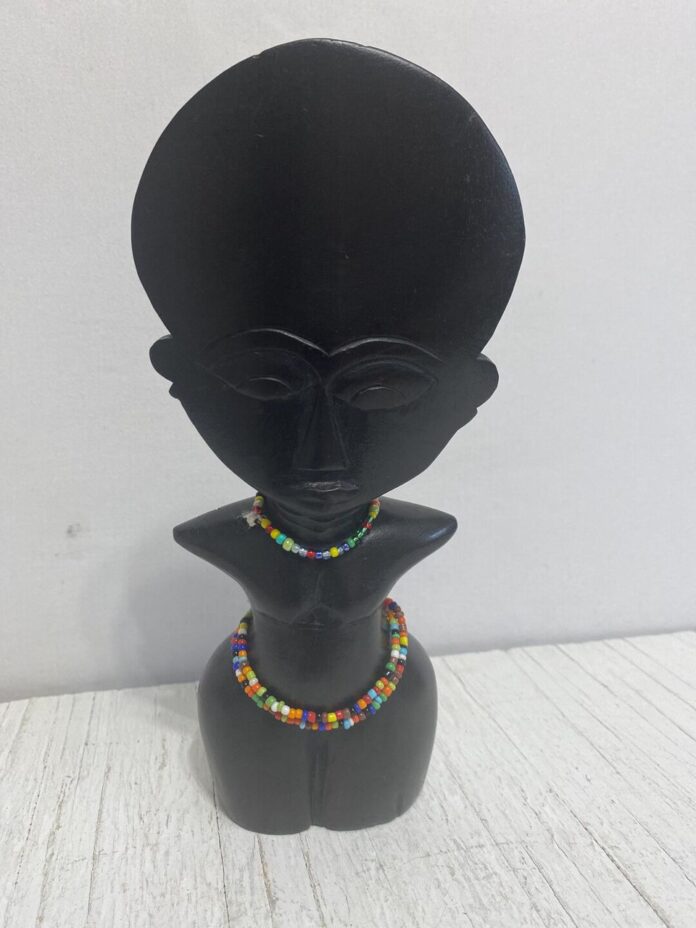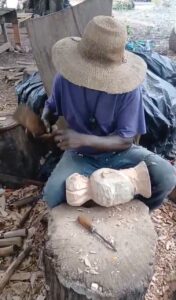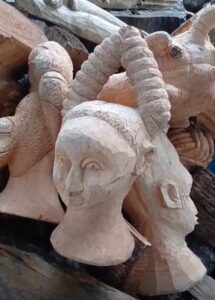At a glance, they appear scary with their bulging disc-like head and slender body. But a meticulous look reveals a unique miniature representing the very soul of an African heritage.
Akuaba, a crafted wooden doll, is traditionally believed to bless infertile women with children even in their despair.
Originally traced to the Fantes and other tribes along the Western coastline of Ghana, the dolls found their path into local arts shops and museums across the country.
In the heart of the Prempeh II Jubilee Museum in Kumasi, wooden crafters are busily sharpening their chisel and other working equipment to carve out the miniature dolls from the logs of wood packed close to their shops.
Patricia Amoh has been working at the museum for years now. She recounts the historic belief in these dolls.
“The belief was that faith in the doll, combined with spiritual rituals, could lead to conception. Some non-Ghanaian women received blessed dolls and successfully bore children,” she said.
The name of the doll is said to have been coined after a barren woman, named Akua, who finally conceived and birthed her first child when she received the doll and reposed the belief in it.
“So, people automatically called the child of hers ‘Akua ba,’ meaning Akua’s child, and that’s how we got the name ‘Akuaba’ in the Asante language,” explained Patricia.
She emphasizes that for one to receive the miraculous child, they must treat it like a real baby – carrying, feeding, and nurturing it with unwavering faith.
The psychological effect
Ms. Angela, another museum staff, highlights the psychological aspect of the Akuaba doll, saying the backlash encountered by infertile women impacts their hormones.
But these biological chemicals become effective once they get the fertility doll and treat it like an actual baby.
“The more pressure she receives from relatives, the more it has a psychological effect on her hormones. But the moment the woman gets herself the Akuaba doll and makes an effort to help herself conceive, by waking up in the morning to feed the Akuaba doll, bathe it, and sing songs to it like an actual baby, it relaxes her hormones and helps her to achieve the fertility rate necessary to give birth,” she emphasized.
Sacred trees?
But are there any sacred trees these inanimate objects are carved out from? Yes!
Nketiah, a wood crafter located among the stretch of local arts shops in Adum-Kumasi, shares the dolls are crafted from sacred woods such as Nyame Dua, Mahogany, and Ebony.
These trees located in the deep forests of Ghana are believed to bear unique spiritual and historic significance.
“Tourists cherish our crafts more than the citizens of Ghana. The said spiritual force behind these fertility dolls comes from the belief that spirits live in trees. And these trees are what we use to make the Akuaba,” noted Akwasi Wusu, an artisan.
Artisans use chisels and other tools to carve them according to specific measurements and designs which are then put on displays to attract buyers.
Once a sought-after artefact, their patronage is declining. Their sale among Ghanaians is low while people in diaspora are always eager to purchase them.
“It shouldn’t be something purchased only in a particular season or by tourists alone, but citizens should embrace and do away with the bad mentality most Ghanaians have about it,” Nketiah said.
June and July are the ripe market for these dolls and other wood carvings.
“During seasonal times like June/July, purchases of up to 2,000 Ghana cedis can be made in a day. Tourists are the ones who buy these dolls and carvings the most, not Ghanaians, even as we celebrate the Ghana Month,” he said.
Puberty dolls
Some carvers are introducing alternatives known as the puberty dolls. Unlike the fertility dolls, these are adorned with wide hips and waist beads, symbolizing femininity and readiness for marriage.
Rituals performed on these dolls are believed to attract suitors for young women.
Lord Bright Appau is one of such fertility doll makers at the Ashanti Cultural Center.
“We have a fertility doll that helps barren women to have a child of their own and a puberty doll, which is believed to attract a man into a woman’s life when she reaches her puberty period,” he said.
The wood carvers are dispelling myths of barbaric practices associated with the doll, as they emphasize the dolls represent faith, hope, and fertility.
“Ghanaians should erase the mentality that these dolls are used for bad things and come to realize that they are used for what we wish to achieve, with our faith attached to it,” they urged.
They clarified that: “trees have spirits living in them. And because they can be carved and used to represent spiritual beings, people perceive these dolls to be used for only bad things, which is not true.”
However, people from the diaspora and African traditional believers assert the Akuaba has an underlying ancient story, thus making their wishes come true.
The doll makers are encouraging Ghanaians to embrace their heritage, especially during the Ghana Month celebration, and support artisans who preserve this cultural legacy.
But they are calling for investments to establish dedicated spaces.
“The government should create a place where people who create these artifacts can work to make more of them and create job opportunities for others” Lord asserted.





